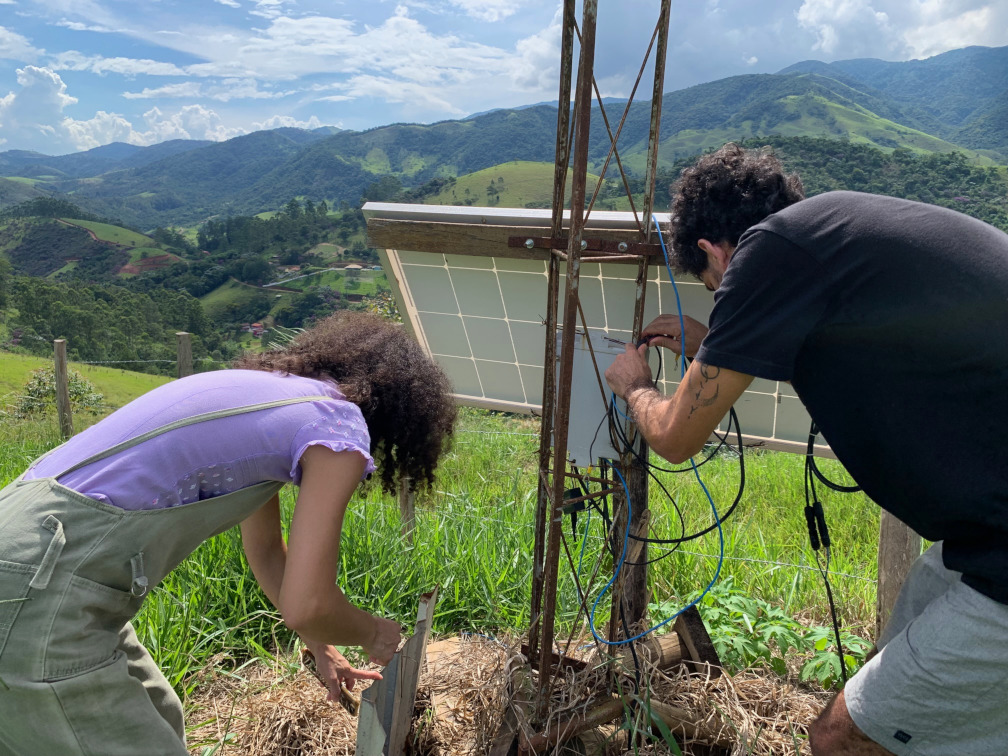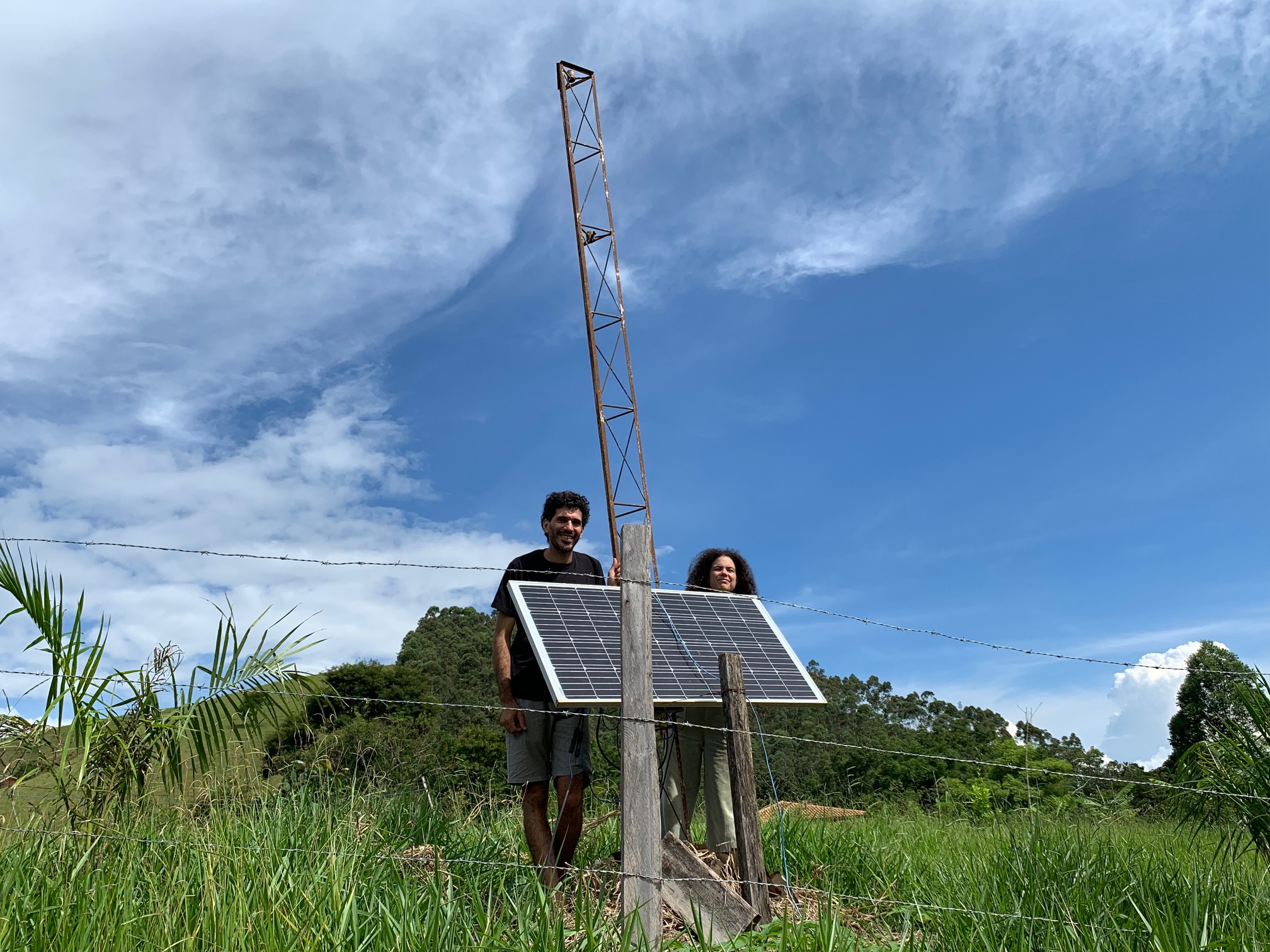
Learn about the Portal Sem Porteiras community network, an initiative by residents of a rural neighbourhood who are promoting community-centred connectivity, local content creation and technological innovation in Brazil (to read this blog post in Portuguese, click here).
The community network Portal Sem Porteiras (PSP) was created in 2018 by residents of the Souzas neighbourhood in Monteiro Lobato, a small Brazilian town of less than 5,000 inhabitants in the state of São Paulo. This is a region of mountains and green landscapes, but which faces a challenge when it comes to connectivity.
The population of Monteiro Lobato has never been served by large telecom operators. Small internet service providers (ISPs) have catered to the town, but some have given up over the years and the service is unstable. Also, the price offered by one of them, around BRL 300 (USD 60), was too high for a population whose average income is BRL 1,460 (USD 260). In fact, it represents a whopping 20% of this income, according to this report in the Folha de S. Paulo newspaper.
A region that requires investment in infrastructure to serve a relatively small population may not be attractive from a business perspective. But when we think from the perspective of the right to communication, lack of connectivity becomes a gap that can accentuate inequalities. It was in this scenario that the PSP community network, which was born as a non-profit neighbourhood association, fitted in perfectly. This community network was selected in the Local Networks (LocNet) initiative's 2021 grant programme with a project focusing on the sustainability and maintenance of the network at a critical moment with the ongoing COVID-19 pandemic. In February 2024, during a visit to the neighbourhood where PSP operates, we were able to see how important it is for the residents these days.

The idea to create PSP came from an opportunity: Hiure Queiroz, one of the residents of the neighbourhood, had technical knowledge about networks and free technologies, and was part of Coolab, a Brazilian collective working with community telecommunication that had just received funding from Mozilla back in 2018 to create new networks in the country. Some residents of the neighbourhood decided to take advantage of this funding to create the network. This starting point was complemented by processes of community coordination to involve more people. One highlight was the Nodes that Bond project to promote the appropriation of information and communications technology (ICT) by women in the neighbourhood. With the goal of making the community network truly collective, "the first challenge was to get women to engage in actions and dialogues about a universe that seemed alien to them,” according to the leads of the project, Luisa Bagope and Marcela Guerra, in the Nodes that Bond Workbook.
Currently, the network has an intranet facility and promotes a shared internet connection purchased from two sources: a satellite connection and another provided by a small local provider. As a result, PSP serves around 120 people and its cost to residents varies, depending on what they can afford – the average being around BRL 30 (USD 5). With no profit motive, the money raised is used to pay for the internet connection, to pay the people involved in the technical maintenance of the network, when possible, and to replace equipment, such as an aerial that was burnt out by lightning in the beginning of 2024. PSP also provides its Wi-Fi signal free of charge in a public square, which is a meeting point in the neighbourhood. Financial sustainability, according to Hiure Queiroz, is still a challenge, but with the support of civil society organisations, the network is fully operational. After Mozilla, PSP partnered with other institutions, including APC and Rhizomatica, through the LocNet initiative grant mentioned above and a previous grant for the women’s project.
Community networks gain meaning in people's daily lives
The community network was important for Stephany Godói, a tradeswoman who increased her sales by 50% by being able to accept forms of payment other than cash, as the Folha de S. Paulo piece showed. And for Marcus Lisboa, one of the people responsible for the network's technical maintenance, who found that this service became an alternative to learn new knowledge and generate income. Likewise for Carolina Ribeiro Defino, a teacher who moved to Monteiro Lobato a few years ago and uses the community network for work and to be in touch with relatives and friends who don't live in the neighbourhood.
Among the local residents, stories abound of the importance of the network: during the pandemic, school lessons went partially online. The Monteiro Lobato region already suffers from fires, heavy rains and floods – events that are becoming more frequent with the climate crisis, according to the community. And having a Wi-Fi internet signal has been crucial in times of emergency. In everyday life, access to the internet can also mean access to alternatives for study, entertainment and income generation. Above all, it is an opportunity to share local content and culture with the world.
Rather than merely filling a gap left by commercial operators, this community network represents a way of changing the logic of connectivity and digital technologies as something that come from outside the communities. On the contrary, it is the people living in that particular context who must decide how, where and why the network functions.

PSP, for example, has been a space for technological innovation and experimentation, such as the creation of bamboo towers to raise the network antennas as a cheaper and more sustainable alternative to steel towers. As LocNet partners through the years, PSP has been contributing, along with other community networks in Brazil and other countries in the global South, by sharing its knowledge through opportunities created to exchange learnings, such as these communities of practice and Latin America meet-ups. In addition to an internet connection, PSP has a local server, created to host services available on the community's intranet. This server also hosts local content and knowledge: Nodes that Bond, for instance, developed a podcast dedicated to dialogue with women in the territory during the pandemic and an audio novel called O Segredo da Montanha, which uses fiction to address real problems faced by local women, such as domestic violence.
From local to national
PSP's experience shows that there are viable alternatives for connectivity and community communication, which are necessary to tackle the endemic digital divide in Brazil and around the world. With a trajectory marked by achievements and challenges, today PSP works with a civil society committee and Anatel, the national telecommunications regulatory body, to create an enabling environment for communities that are connecting themselves through public policies, regulation, and financing alternatives via universal service funds (FUST). The existence of a regulatory environment that acknowledges the role of community networks can foster support from small and large internet service providers.
“It's important to emphasise that PSP is a community network that serves our context, and that there is a great diversity of community networks in Brazil, such as in Quilombola, Indigenous and traditional territories,” says Potyra Aguiar, PSP's representative in the working group created by Anatel on community-centred connectivity. With this quote, she points to the importance of creating supportive conditions, while also acknowledging and respecting the self-determination of communities throughout the country.
Photos: Débora Prado
This piece was written with information shared by Portal Sem Porteiras as part of the project Connecting the Unconnected: Supporting community networks and other community-based connectivity initiatives for the Seeding Change column, which presents the experiences of APC members and partners who were recipients of funding through "Connecting the Unconnected" grants and of subgrants offered through other APC projects and initiatives. The information was supplemented with other updates received during a visit to the community network in February 2024.
Did this story inspire you to plant the seeds of change in your community? Share your story with us at communications@apc.org.